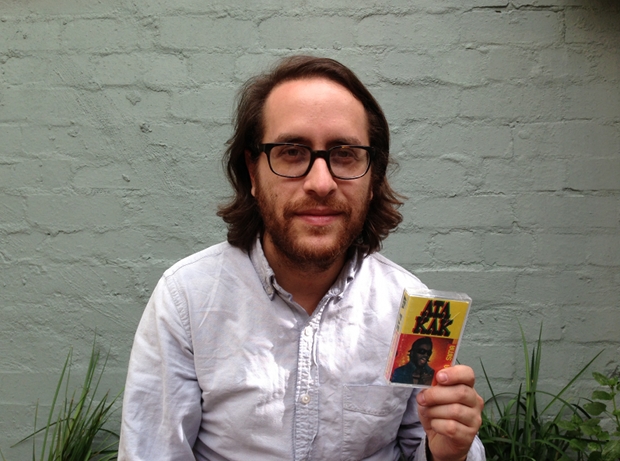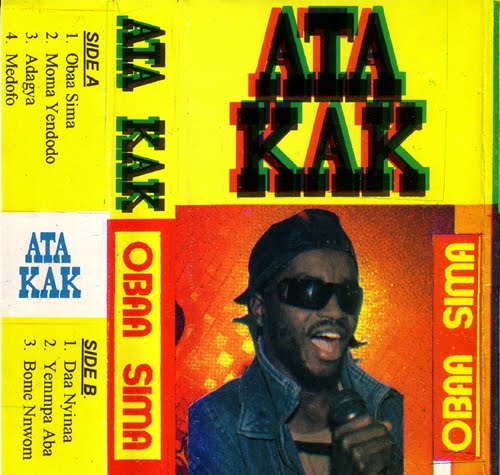Over the past decade, the blog-then-label Awesome Tapes from Africa has been at the forefront of a new wave of "world" labels, one that attempts to better reflect the messy complexity of musical cultures across the African continent. Leaving questions of cultural authenticity beyond, Awesome Tapes has been just as likely to focus on Michael Jackson loving Somalian disco/funk or Tanzanian rap as more "traditional" genres like juju or mbalax. But behind all of it has been one record. One astounding, surprising, dance-floor slaying record by a mysterious Ghanian producer named Ata Kak. A record which is, after years of effort, finally receiving its proper release. Afropop producer Sam Backer interviewed label-owner Brian Shimkovitz about the journey to "Obaa Sima." Stay tuned for Afropop's interview with Ata Kak himself, coming soon!
Sam Backer: So, to start with--this is a pretty crazy record you're putting out.
Brian Shimkovitz: Yeah, it was a super crazy record and it was a big part of the inspiration for the original blog project. Because after going through a whole bunch of the tapes that I had gotten on two trips to West Africa, I was listening to this one in my apartment in Brooklyn and I was just like, "people need to hear this." This is something that nobody imagines, that after a year of doing research in Ghana about music I was completely astounded existed, and I immediately started asking people about it and nobody knew who Ata Kak was. Not Ghanaians or North Americans. No one I spoke with. So I just posted it. I was literally sitting there one day and I was like "I'm gonna start a blog."
Wow. Let's rewind a little. How did you first get to Ghana? And why were you buying cassette tapes to begin with?
I first went to Ghana in 2002 as a study abroad project for a semester. And while I was there, I started doing research about the music industry. I was going around collecting tapes because it was 2002, and at that time, the majority of the music available on the market was on cassette. So I would go to shops, or I would go to the areas in the market where they sell lots of music. Or if I saw someone wandering around the neighborhood selling cassettes, like on a wheelbarrow or a bicycle or something, I would just check it out. And I would sometimes buy things because they were really cheap. They were only like 75 cents or a dollar each, so I just bought a lot! And one of the things that I bought on that first trip, that I came across in Cape Coast, was this Ata Kak tape which I didn't really listen to until much much later.
Do you remember where you bought it?
Yeah, I bought it in front of the Standard Chartered Bank. On the corner, down by the ocean. I bought it from an older dude in, not a wheelbarrow but...it was like a trolly with big wooden wheels and a wooden platform. People put stuff on it and then they yank it around, kind of like a hand-pulled forklift. He was selling stuff on that. It wasn't wrapped up, it was one of the cassettes that was just may or may not have been used, may or may not have been very bootleg. And in that particular instance I didn't talk to him about it, I just grabbed a bunch of tapes. There were definitely other times when I sat there for half hour, an hour, and chatted with the person who was selling music and tried to find out information about it. But I didn't that time.
Were they playing the tapes? Did you hear it before you bought it?
Oh no, he wasn't playing it in this instance. I was attracted to it by the cover. I mean- the cover's amazing. I saw the cover and was like, all right, I'll buy this. I didn't go through and listen to each and every tape, really, until later. I don't have any memory of listening to this tape until 2005, 2006, in my apartment.
So that was like three or four years later.
Right. After I went to Ghana, I was sending all these tapes back to my parent's house in Chicago but I was living in Bloomington, Indiana. and this tape remained with a whole bunch of tapes that never made it to Bloomington. So I graduated college and moved to DC, and then I moved to Thailand for a year, and then I moved to Ghana. And it wasn't until after a year in Thailand and a year in Ghana that I moved to Brooklyn. And that's when I brought all those tapes that I had collected over the years into one place. And I that's when I started really going through deeper, and listening deeper. And that was when the inspiration for the blog started.
So, you're sitting there, and you're listening and your listening. You're just going through all these cassette tapes you'd collected.
I realized that these tapes were not available. And there was so much surprising stuff. I had no idea how to get these tapes distributed in America but it was 2006, blogs were a relatively new thing. And I wanted to share it with my buddies and acquaintances. And I had no idea, you know. I mean, obviously someone's going to come across it if they're Googling but I thought it would all be specialists. I didn't know that it was gonna be occurring kind of concurrently with an overall interest in more international music among people who would typically just buy indie rock or rap records. It all converged.
Yeah, and with the Internet just blowing open people's tastes
Right, and like a new concept of world music.
Tell me a little bit more about that. Because that's something that we talk about a lot at Afropop, because we were around for both booms, or spikes in interest, or whatever we should call it.
Do they see it as a new boom? Or do they see it like, this has always been a thing, and all of you guys just started noticing?
I mean, it's different. I think we see the interest, but it's very different because it's more distanced in a way. It's a lot of the older music and there's...
Very specific genres.
Right. Very specific genres. It's also bands that are almost by definition not available. It's like, listening to this music through the prism of DJ culture.
And we don't have very much information. At least back then in the early '80s there was a lot of like, care, with regard to liner notes and at least pretending to present folksy stuff, even though most of it was manipulated for the Western marketplace.
But it's also that the bands would tour.
But now it's like DJs and producers are selecting the weird left field tracks that they know like kids in France will dance to.
Definitely. But I do think that it's important that the bands used to be able to tour. Like, King Sunny Ade used to come.
Yeah... that's so different.
So was this one of the first tapes that you put up?
Ata Kak was the very first tape that I posted on the blog. Kind of as a manifesto almost.










